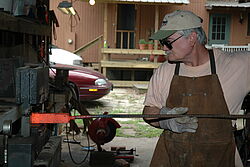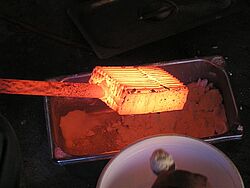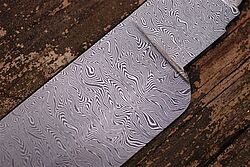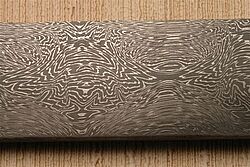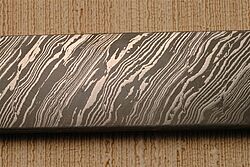
Why Damascus?
Some of the most dramatic and visually beautiful blades are forged from damascus steel. True damascus steel or "wootz" was originally forged in India and distributed through the markets of Damascus, Syria hundreds of years ago. Most of today's smiths produce steel more properly referred to as pattern welded laminate steel. However, due to overwhelming common usage, we now call it damascus steel.
Several variations of producing damascus exist, but the majority of blades begin as flat pieces of steel representing two or more different types. These are stacked alternately, similar to a deck of cards. At this point, using pressure and high temperatures, this billet is forge-welded into a single solid piece. Lengthening the billet out, cutting, re-stacking, then welding again increases the number of layers exponentially. By this method the smith can produce billets of several hundred or even thousands of layers in a relatively short period of time.
By twisting, stock-removal, welding dissimilar billets together, utilizing powdered steel, etc, countless designs can be produced. There is no end to the fantastic patterns and colors that can be produced by a skilled smith with a good imagination.
A blade forged from damascus steel appears pretty normal as it is refined. Once the blade is at the point where a regular blade is finished, the damascus blade is immersed into a solution of mild acid. The different steels used in the original mix react differently to the solution. Some are eroded away while the more resistant layers stand out. Some turn dark and others remain light as the pattern is revealed.
Why damascus? Because it is beautiful! Damascus is not magical, but it is every bit as good as a single steel blade. Every variety of steel that I use in my mixes is each, in its own right, a superlative knife steel. Except for the extra cost, there is absolutely no reason not to use a damascus knife for the same tasks you would use your single steel blade. Damascus is equally good and maybe better for some tasks. Furthermore, a damascus blade is more resistant to rust and pitting than a normal high-carbon steel blade.
I personally use damascus blades for everyday jobs and always rely on them while in the field in far away locales.
